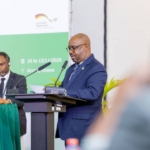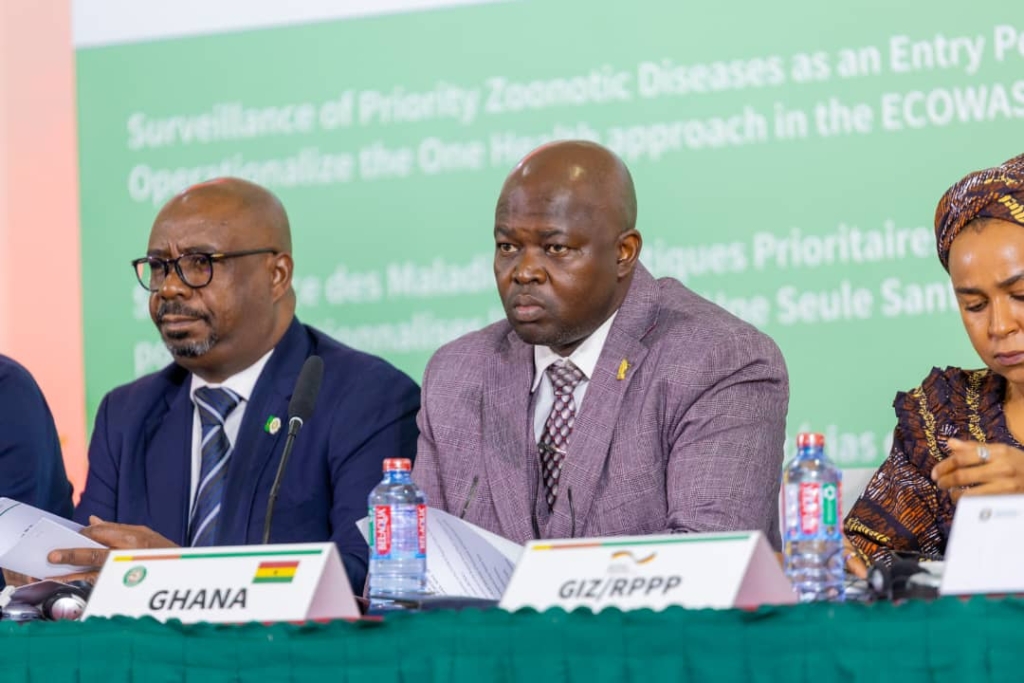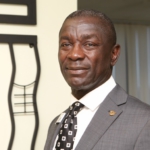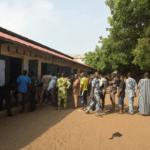
The Economic Community of West African States (ECOWAS) has officially opened the Annual Regional One Health Technical Meeting 2025 on the theme: “Surveillance of Priority Zoonotic Diseases as an Entry Point to Operationalize the One Health Approach in the ECOWAS Region.”
The four-day meeting, taking place from 10 to 13 November 2025 in Accra, Ghana, brings together Member States, ECOWAS institutions and agencies, other regional institutions, and partners to discuss how cross-sectoral surveillance can strengthen regional preparedness and response to zoonotic and emerging diseases.
Opening Highlights
At the opening ceremony on 10 November 2025, representatives from ECOWAS institutions and partners reaffirmed their commitment to translating the ECOWAS Regional One Health Strategy (2025–2029) into action.
On behalf of Germany, GIZ commended ECOWAS for fostering intersectoral collaboration as a foundation for regional health security. Fatima H. Zanna, Head of the BMZ funded RPPP programme implemented by GIZ, emphasized that health is a major driver of the economy and that resources invested in health must yield broader gains for economic development and regional stability. She noted that this underscores the need for greater efficiency and coordination across sectors, especially amid dwindling global funding.
In his opening remarks, the Executive Director of the ECOWAS Regional Centre for Surveillance and Disease Control (RCSDC), Dr. Mamadou Diarrassouba, reiterated that collaborative surveillance is the backbone of effective disease prevention and early warning.
He highlighted that the presence of Member States and partners demonstrates the region’s collective commitment to advancing the One Health agenda, while calling for sustained innovation and cooperation to address ongoing health security challenges across West Africa.
Participants also heard remarks from the Quadripartite representative, WHO AFRO, and EU Delegation to ECOWAS, who underscored the importance of synergy between the human, animal, and environmental health sectors in achieving resilient systems.
The Director General of Health from Côte d’Ivoire, Professor Mamadou Samba, further noted that the rapid expansion of human settlements into virgin ecosystems is increasing the risk of zoonotic transmission, emphasizing the relevance of the meeting in shaping practical and sustainable regional responses.
The Director General of the Ghana Health Service, Professor Samuel Kaba Akoriyea, officially opened the meeting on behalf of the Honourable Minister of Health.
He highlighted Ghana’s progress in implementing the One Health approach—including digital surveillance and intersectoral coordination with the Veterinary and Environmental Services—and stressed that no country can achieve health security in isolation. He urged participants to approach the meeting with purpose and commitment, identifying practical solutions that will enable sustainable progress toward a safer and healthier ECOWAS region.

About the Meeting
The meeting aims to explore how One Health surveillance of priority zoonotic diseases can serve as an entry point to strengthen data sharing across sectors and enhance early detection and response mechanisms.
Participants are discussing practical strategies to:
- Promote harmonized indicators and data sharing across sectors and Member States;
- Identify gaps and good practices in national One Health surveillance systems;
- Establish a Regional One Health Surveillance Community of Practice (CoP); and
- Validate the 2026 Annual Work Plan of the ECOWAS Regional One Health Secretariat.
Regional Impact
By focusing on rabies as a practical model, the meeting showcases how a well-structured surveillance system can catalyze progress toward comprehensive One Health integration. Outcomes of the discussions will inform the establishment of the regional One Health Surveillance CoP and guide collective actions for the coming year.
Early exchanges among participants have already highlighted the need for stronger data harmonization, capacity building at national levels, and sustained commitment to joint surveillance and response initiatives.
Participants
The meeting gathers representatives from ECOWAS Member States across human, animal, and environmental sectors, as well as ECOWAS institutions (RCSDC, RAHC, DENR), technical partners, academia, and civil society organizations engaged in zoonotic disease prevention, surveillance, and response.
About the ECOWAS One Health Initiative
The ECOWAS One Health Initiative promotes coordinated action among human, animal, and environmental health sectors to strengthen the region’s resilience against health emergencies. It is implemented through close collaboration among ECOWAS institutions and supported by technical and development partners.
About GIZ (Deutsche Gesellschaft für Internationale Zusammenarbeit)
As a service provider with worldwide operations in the fields of international cooperation for sustainable development and international education work, GIZ works with its partners to develop effective solutions that offer people better prospects and sustainably improve their living conditions. GIZ is a German federal organisation that supports the German Government and a host of public and private sector clients in a wide variety of areas, including economic development and employment promotion, energy and the environment, and peace and security.



